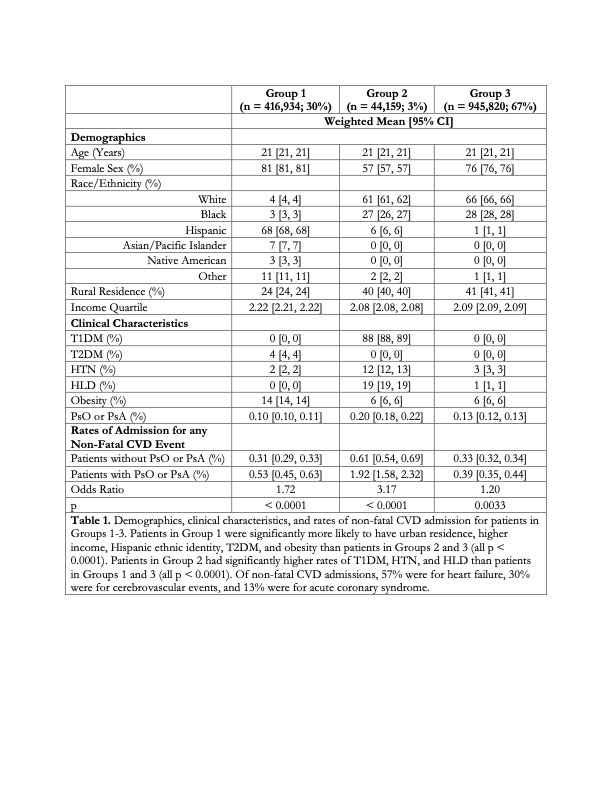Session Information
Session Type: Poster Session A
Session Time: 10:30AM-12:30PM
Background/Purpose: Psoriasis (PsO) and psoriatic arthritis (PsA) are closely linked inflammatory conditions that can affect both children and adults. In children, these diseases are associated with traditional cardiovascular disease (CVD) risk factors and subclinical atherosclerosis. In older adults, systemic inflammation from PsO and PsA accelerates atherosclerosis, and these conditions are independent risk factors for severe CVD events including acute coronary syndrome, stroke, and cardiovascular death. While subclinical and accelerated atherosclerosis from systemic inflammation has been demonstrated, there have been no studies assessing the burden of non-fatal severe CVD events in transition-age young adults with PsO and PsA.
Methods: We used data from the National Inpatient Sample database between 2016 and 2019, which comprises a stratified sample of patients admitted to hospitals in the United States. Across all four years, we identified 1,406,913 records for patients aged 18-24. We performed a cluster analysis to identify groups of patients with similar baseline health status based on comorbidities and personal demographics. We then compared rates of admission for non-fatal CVD events between patients with and without psoriasis, stratified by these clusters, to test the hypothesis that inflammation-driven atherosclerosis from PsO and PsA causes early CVD events, and thus a higher rate of CVD admissions, independent of baseline health and other comorbidities as indicated by cluster identity. This approach allowed us to test this hypothesis empirically.
Results: Our cluster analysis identified three distinct demographic groups as follows: Group 1) urban-dwelling higher-income patients of non-White or Black race/ethnicity with type 2 diabetes mellitus (T2DM) and obesity; Group 2) patients of White or Black race/ethnicity with type 1 diabetes mellitus (T1DM), hypertension (HTN), and hyperlipidemia (HLD); and Group 3) patients of White or Black race/ethnicity without a significant burden of traditional CVD risk factors. In all three groups, transition-age patients with PsO or PsA were more likely to be admitted for a non-fatal CVD event including heart failure, stroke, and acute coronary syndrome (Group 1 OR 1.72, p < 0.0001; Group 2 OR 3.17, p < 0.0001; Group 3 OR 1.20, p = 0.0033). Group 2 had both a higher prevalence of PsO/PsA and a greater magnitude of difference in admission rates between patients with and without PsO/PsA compared to Groups 1 and 3.
Conclusion: These data are consistent with our hypothesis that accelerated atherosclerosis from systemic inflammation in PsO and PsA leading to early CVD events is a relevant concern for transition-age young adults beyond what can be explained by baseline health status and traditional CVD risk factors. Further research is needed to develop CVD prevention, screening, and risk stratification strategies for patients in this high-risk age group.
To cite this abstract in AMA style:
Goel A, Tanzer J, Gilvaz V. Psoriasis and Psoriatic Arthritis Are Independent Risk Factors for Non-Fatal Cardiovascular Admissions in Transition-Age Young Adults [abstract]. Arthritis Rheumatol. 2024; 76 (suppl 9). https://acrabstracts.org/abstract/psoriasis-and-psoriatic-arthritis-are-independent-risk-factors-for-non-fatal-cardiovascular-admissions-in-transition-age-young-adults/. Accessed .« Back to ACR Convergence 2024
ACR Meeting Abstracts - https://acrabstracts.org/abstract/psoriasis-and-psoriatic-arthritis-are-independent-risk-factors-for-non-fatal-cardiovascular-admissions-in-transition-age-young-adults/

